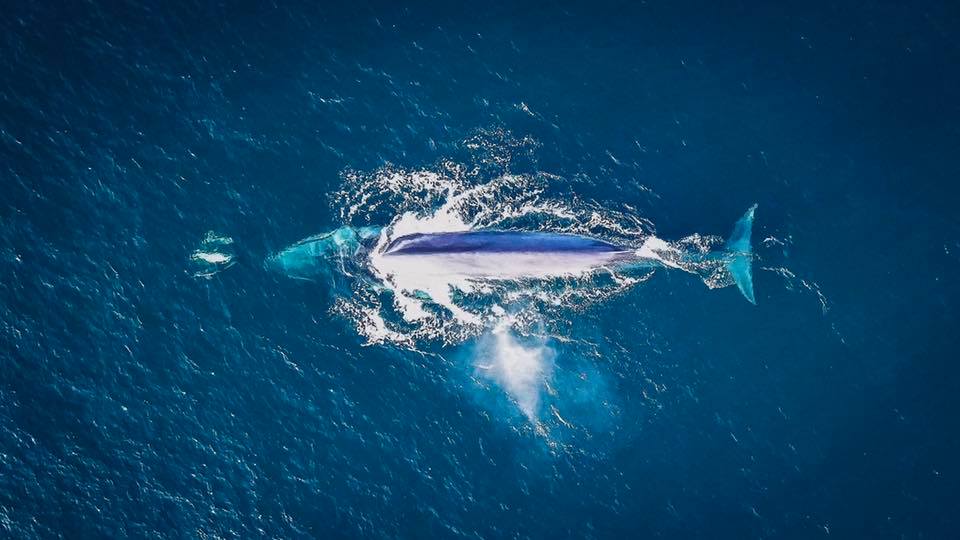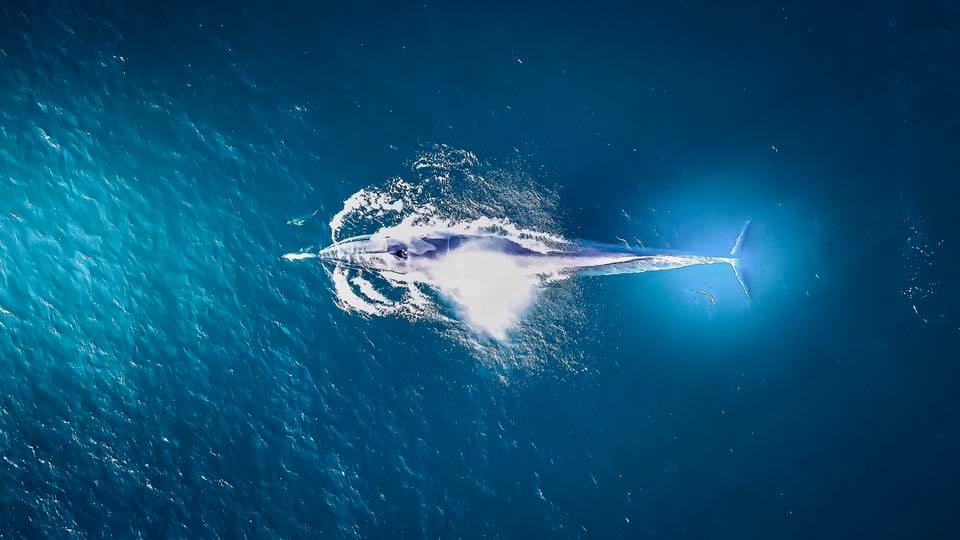First Drone Footage of a whale in Irish waters!
Citizen science coupled with modern technologies, camera phones, video's and unmanned aerial vehicles (UAVs) can provide valuable insight into the ecology and social structure of large rorquals off the south coast of Ireland and help researchers gain valuable knowledge of the lives of elusive marine megafauna species, to which we know so little about.
Ireland is home to a diverse array of marine megafauna from large fishes such as Atlantic bluefin tuna ( Thunnus thynnus ) to a variety of shark and ray species and to date, up to 25 species of cetaceans have been recorded here.
Fin whales ( Balaenoptera physalus
) are the second largest animal on Earth, with adults reaching an average length of 18 to 22 meters. These whales are classified as mysticetes or baleen whales, in other words, they lack teeth and instead have baleen plates (i.e bristles made of a similar protein to keratin) that hang from their upper jaw. These baleen plates, their large jaws and extendable throat grooves are what allow these filter- feeding whales to forage on some of the smallest pelagic fish species in Irish waters; krill, herring and sprat (Ryan et al.,
2014).
Fin whales are easily identifiable, equating to the size of two buses, often with a very high vertical blow that can reach up to 9 meters in height. The fin whale's head often breaks the waters surface as they emerge to breathe. One distinguishable feature of a fin whale is the lower right jaw is white and they have a long rolling back before you see the dorsal fin upon surfacing. Fin whales do not usually fluke, the way smaller whales, such as humpbacks ( Megaptera novaeangliae
) do, so identifying and cataloguing fin whales is more difficult, especially due to their often "plain" fins lacking notches and nicks.
The fin whale is found globally in temperate and tropical ocean basins and it is thought that temperate animals may migrate towards the tropics in the winter to calve. Four separate populations of fin whales have been identified; The North Atlantic, Pacific, Southern Ocean and the Mediterranean. In the North Atlantic many threats to fin whales still exist with pro-whaling countries such as Iceland, over-exploitation of "bait" fish like herring and sprat, pollution, entanglement in fishing gear, ocean noise from offshore oil & gas operations, ship strike and disturbance from eco-tourism, also pose a threat and effects are often cumulative.
In Irish waters, fin whales highest relative abundances have been reported off the south coasts of Ireland in studies fromdedicated ship-based and aerial surveys carried out by University College Cork (UCC) cetacean researchers and records from the Irish Whale and Dolphin Group (IWDG). Currently UCC cetacean researchers are on-board the R.V. Celtic Voyager, carrying out a survey of killer whales ( Orcinus orca
). Follow Ph.D. researcher Roísín Pinfield's blog here: https://scientistsatsea.blogspot.com/.
Although the southern coast of Ireland has been identified as a "hot-spot" for foraging baleen whales, fin whales have been recorded on all coasts, east, north and west, also. Some individual fin whales have been shown to have site fidelity to certain areas, having been recorded in the same place over consecutive years (Whooley et al.,
2011).
With recent advancements in technology such as unmanned aerial vehicles or "drones", we can gain better insight into the fine scale behaviour and health status of these impressive leviathans as they feed in productive waters off the south coast of Ireland.
However, it is important that people and drones remain a safe distance from the whales to reduce the risk of disturbance. Flying ~100 meters above the whales is recommended and you can also follow our SEASAFE Drone Observer Guidelines at orcaireland.org.
If you would like to support marine megafauna conservation, please visit our website and make a donation today. Become an #OceanHero and download the App "Observers" to get one years free membership when you sign up via the members tab. All ocean lovers can help protect these marine wildlife in Ireland just by submitting records of what they see. Be it seals, sharks big fishes or cetaceans (whales and dolphins) you can help contribute to science to help us to protect these magnificent animals.
References:
Ryan C., Berrow S.D., McHugh B., O’Donnell C., Trueman C.N. and O’Connor I. (2014) Prey preferences of sympatric fin ( Balaenoptera physalus ) and humpback ( Megaptera novaeangliae ) whales revealed by stable isotope mixing models. Marine Mammal Science 30, 242–258.
Whooley P., Berrow S. and Barnes C. (2011) Photo-identification of fin whales (Balaenoptera physalus L.) off the south coast of Ireland. Marine Biodiversity Records 4, e8.
SHARE THIS ARTICLE
















